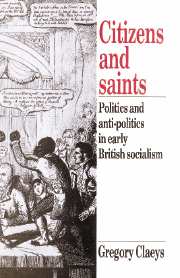Book contents
- Frontmatter
- Contents
- Acknowledgements
- List of Abbreviations
- Introduction:
- PART I THE ROOTS OF POLITICAL AND ANTIPOLITICAL SOCIALISM
- PART II SOCIAL SCIENCE, POLITY AND ECONOMY
- 3 The ‘eye of the community’: social science as communitarian government
- 4 ‘A mere trifle by comparison’: social science, republicanism and political economy
- PART III THE ORIGINS OF SOCIAL RADICALISM
- Bibliography
- Index
4 - ‘A mere trifle by comparison’: social science, republicanism and political economy
Published online by Cambridge University Press: 04 December 2009
- Frontmatter
- Contents
- Acknowledgements
- List of Abbreviations
- Introduction:
- PART I THE ROOTS OF POLITICAL AND ANTIPOLITICAL SOCIALISM
- PART II SOCIAL SCIENCE, POLITY AND ECONOMY
- 3 The ‘eye of the community’: social science as communitarian government
- 4 ‘A mere trifle by comparison’: social science, republicanism and political economy
- PART III THE ORIGINS OF SOCIAL RADICALISM
- Bibliography
- Index
Summary
The notion of ‘social science’ did not only encompass an account of how society might be organised so as to supersede the more punitive and coercive functions of government. Social science was indeed to replace the art of government as it had been hitherto practised. But the concept was also intended as an explanation for the insufficiency of existing theories of political reform, and of the science of government as it had been previously understood. In particular, social science aimed to demonstrate that radicalism relied far too heavily upon an outmoded conception of the relationship between government and the economy. The radical reformers’ central economic assumption was that prosperity would ensue once the burden of governmental taxation imposed by ‘Corruption’ was eased. This approach, the Owenites insisted, had been surpassed by wartime economic developments, which demanded new theories of economic activity, and a greater role for government in guiding the economy. Without a new analysis of the economy, radicalism would be simply unable to conceptualise largescale and permanent unemployment, mechanisation, and commercial and monetary crises, or to propose appropriate political responses to them.
The desire for a new approach to politics from an economic perspective was shared in part by the classical political economists. Many of these agreed that an alleviation of taxation would be economically beneficial, but argued that traditional theories of government paid far too little heed to the existence of natural laws of economic development which, far from requiring greater intervention and regulation in favour of the poor, demanded as little interference with the market mechanism by political authorities as possible.
- Type
- Chapter
- Information
- Citizens and SaintsPolitics and Anti-Politics in Early British Socialism, pp. 142 - 166Publisher: Cambridge University PressPrint publication year: 1989

